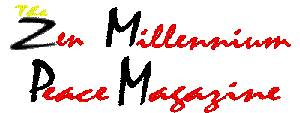

In Defence of Anarchism
The conventional view of anarchy is very simple. Anarchy means absence
of government; government is necessary to maintain law and order; without
law and order, life is hell for everybody.
Therefore, government is good and anarchy is bad. All decent people can
understand propositions so simple and self-evident; therefore, people who
actually advocate anarchy must be either wicked or unbalanced. The conventional,
seemingly plausible view is nevertheless incorrect.
The connection between anarchism and pacifism is very close, and I propose
to commence with pacifism.
Pacifists are people who refuse under any circumstances to be a party to
the shedding of human blood. A characteristic slogan summarising the pacifist
conviction: "Wars will cease when men refuse to fight"-
and only when men refuse to fight. Pacifists accordingly declare in advance
their solemn intention not to fight and invite you, non-pacifists, to join
them. The logic is impeccable. But the wars go on just the same; moreover,
they get worse.
So the pacifist must ask why this rational remedy is not producing the desired
results. " Come and join us", the pacifists say, but they appeal
in vain. Is it not odd? Virtually nobody wants war; why then do people prefer
so stubbornly to reject the pacifists' self-evident solution?
Wars do not happen out of the blue - ever! It is not possible, simply because they require too much advance preparation. They are always preceded by a state of armed preparation. Why? One of the most urgent tasks is to illuminate public opinion at least sufficiently to make it impossible for Ministers of Armaments any longer to masquerade under the cloak of "Defence".
The reservoir of armed violence (as large and destructive as every government can possibly afford), permanently on tap, is necessary because without it a government would be at a disadvantage vis-a-vis other governments, whose armoured reservoirs it does not (as yet) control.
Disadvantaged in what respect? In the matter of control over wealth, people, natural resources, that is to say, power. Governments themselves pretend that they innocently seek no more than an equilibrium; but the falsity of this claim is evidenced by the fact that equilibrium could be maintained at the level of one soldier each, and this kind of equilibrium never exists. Moreover, the allegedly sought after equilibrium has always erupted in war and must always do so, because the reality is a struggle for power, that is to say, domination.
Government results not from the welfare necessities of people inherent in their God-given or biological situation; but it results from the all-consuming, devouring determination of some individuals to obtain, consolidate and, if possible, expand their power over their fellows.
Nothing can ever legitimise this state of affairs for two simple reasons:
firstly, the terrible consequences that ensure from this theory for humankind
as a whole in the shape of ceaselessly recurring war; and secondly, because
human beings are in fact in all essentials equal: and it is a violation of
God's will that some people should be subjected to the power and domination
of other people, when all people are alike God's creatures, subject in common
not to other people like themselves but to God alone.
Power by definition means the ability to force someone to do that which they
would not do of their own free will, and it is precisely this that is not
justifiable. It is from this element of force, of coercion, that all the resentment
and counter-irritants and desire for vengeance, in short, evil, are triggered
off. It is previous power - a legacy of countless acts of power - that has
made the present oppressor or aggressor what he is; and more power can only
add to the evil ingredients of the existing situation.
The only reply to power and its evil consequences is not counter-power, which
is simply more power, but anti-power, which is the opposite of power,
namely courageous, unyielding powerlessness, or love.
Violence itself is the outcome of the will to power in man. Chairman Mao was undoubtedly right when he observed that "political power flows out of the barrel of a gun", but he forgot to add the even more important converse of the proposition, namely that the barrel of a gun flows from the will to power. It is this will to power itself which is the source of most of the evils which threaten to overwhelm us.
To abstain, therefore from the quest for power is logically entailed by
an understanding of the evil of violence. To renounce power means abandoning
all idea of getting power, of seeking to overthrow the rulers, of bringing
about a revolution, of devising blueprints for new institutions. In their
stead, anarchists seek to eradicate the evil potentialities in themselves
and, by so doing, to change the nature of their relations with other people.
When enough people succeed in doing this, the social institutions which
reflect existing human beliefs and relations, will of necessity begin to
change.

